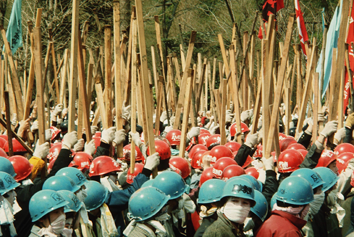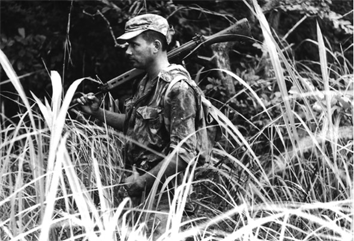

- Category:Non-Fiction, Political
- Date Read:7 June 2021
- Pages:351
- Published:2017

If it were today some things that I did there, I wouldn’t do them today, I wouldn’t [...] ermm (nervous laughter) I don’t know (clears throat) for example, I don’t know killing (clears throat, sighs) that that is one thing that (clears throat) (long pause) it is not everybody who approaches an (very strained voice) an individual and then, that it (long pause, very faint voice) at the time we at the time, we didn’t have such problems, wasn’t it nowadays I wouldn’t have done it, no.
For many caught up in the bravado of war, images of grandfathers defeating fascism, of sacralised distant conflicts and great man theory, war is often synonymous with regret. For Yukio Mishima it was the regret of missing out, materializing in his novel Confessions of a Mask. Widely interpreted as a work of self-examination, Kochan grapples with his developing sexuality and heterodoxy within militaristic Japanese society. Death and eroticism are intertwined, he obsessively fantasizes over his male classmate Omi and Guido Reniâ’s painting of St. Sebastian bristling with arrows:
The arrows have eaten into the tense, fragrant, youthful flesh and are about to consume his body from within with flames of supreme agony and ecstasy....That day, the instant I looked upon the picture, my entire being trembled with some pagan joy. My blood soared up; my loins swelled as though in wrath. The monstrous part of me that was on the point of bursting awaited my use of it with unprecedented ardor, upbraiding me for my ignorance, panting indignantly.
Infatuated with the eroticism of destruction, these unrequited fantasies are a continual source of torment. He attempts to court Sonoko for purely pragmatic reasons and have sex with female prostitutes, actions that demarcate into a “mask”, attempts to sublimate his urges. World War II is Kochan’s answer, relieved by the prospect of dying during military service, freeing him from his artifice and attaining the idealistic end he fantasizes about. Yet he comes down with an illness and is relegated to a desk job instead of enlisting. The tone descends into fatalism and mental surrender as he is unable to die in battle nor marry into a “conventional” family unit.
After World War II the age of imperialism was over. The Japanese emperor turned into a vestigial remnant of the past. Great Britain licked its wounds and maintained food rationing into 1954. The American economy rocketed up with any opposing European industry reduced to rubble. In Japan the perpetrator-victim binary was central to post-war political discourse. The country laid in a constant state of contradiction, bombed into dust by star-adorned planes only to have a 4-star become the new “father of the nation.” American jets took off from Okinawan naval bases to extinguish the spectres of Japanese imperialism in Korea and Vietnam. The Japanese left called on the hypocrisy of the metropolitan government, the pacifist state borne through the horrors of war as the higaisha (victim) gradually transforming into the kagaisha (perpetrator). Mishima critiqued modern Japanese society for losing its essentialist “warrior culture”, establishing the right-wing civilian militia Tatenokai (shield society) He was an ideological anachronism, espousing monarchist tradition in an age of globalization. He was attempting to revive a war he had failed to participate in.
For peripheral countries these post-war transformations also spurred their own transformations. The Hindus who fought for Japan, the North African Arabs that fought for Germany, World War II delineated traditional notions of nationhood and colonial allegiance. With wilting paternal hard power, the nationalist and ethnic fissures that the conflict laid bare would erupt in civil wars across Asia, the Middle East and Africa for the next three decades. An Oral History of the Portuguese Colonial War: Conscripted Generation is about the men who fought in Angola, Guinea-Bissau, and Mozambique, part of the revolutionary wave that gripped the sixties. Between 1961 and 1973, 90 percent of Portugal’s young men were mobilized in both combat and non-combat roles; staggering numbers for a country of only 9 million. Sociologist Angela Campos compiles ethnographic fieldwork interviewing those veterans about their experiences fighting in a deeply unpopular war that spurred the Carnation Revolution, outlining the human consequences of a forgotten, uncomfortable period of Portuguese history.
In the early afternoon of 1 August 2007, I found myself in a small southern Portuguese town sitting in the living room of an average family. Before me, a flustered and angry tattooed war veteran narrated his war experience in Angola from 1967 to 1969, adding the highlights and themes of nearly four decades that had elapsed since his return...Between mutual accusations, tears, and shouts, the state was blamed, the war was cursed, the army was both exalted and denigrated, and plenty of regrets and demands were expressed. The scene was compelling and vital in its pungent authenticity. Like many others in Portugal, decades after the conflict, this family did not know what to do with “their war, their hell.”
Domestically, the 13-year conflict wasn’t called a war but a series of “Overseas Campaigns”, the sort of meaningless business speak you hear in boardrooms. The unsavoury optics of the war, Portugal still hanging onto its colonies in contrast to other NATO members, had isolated the country politically leaving them alongside questionable regional allies like Rhodesia and South Africa. The popularity of the war, domestically, was spotty from the outset. Often called “Portugal’s Vietnam”, the use of conscription against Marxist-Leninist insurgents led thousands to illegally emigrate to France and the US: “in 1961 the percentage of absentees was 11.6%...between 70 and 72 stayed very close to 21%.”
Anecdotes by the Portuguese troops place them squarely within the Japanese post-war perpetrator-victim binary. Unlike Mishima’s unrequited militarist ideal, regret is directed towards not abstaining from the war, but participating in it. The book tells of fresh conscripts instantly disillusioned with empire-building after arriving in Africa, their own conceptions about Portuguese foreign policy falling away within hours of landing:
veterans reinforced their feelings of incredulity, shock, and bewilderment at the reality encountered in those territories then considered an integral part of Portugal. For some, it started with the “terrible” sight of crowds of hungry, ragged black people around the harbor where the military personnel were arriving, begging for something to eat and displaying signs of a life of “near slavery”.
The image propagated by the regime of a cohesive Portugal from “Minho to Timor”, championing equal citizenship rights, irrespective of colour or birthplace, and proud of its humane five-century empire in Africa and elsewhere, crumbles completely.
Retrospective motives for these ex-combatants to participate in the war vary. However, it is clear that the soldiers’ youthful fascination of visiting the virgin forests of Africa or their belief in defending the motherland is quickly dispelled. Many voice their frustrations towards the Salazar government, having been sent off poorly-equipped and forgotten in a non-consensual war. Staggeringly blunt condemnations of the war by ex-combatants line the book and what was startling was the ambiguity in some of the testimonies, the blurring of perpetrator/victim/sufferer or witness in these cathartic recollections, R. Henrique states: “[It was] For nothing, we were just cannon fodder, so many people died there the [African] countries became poorer and so did ours.” Some who opposed the war pre-departure interpreted their compulsory participation as “confirming long-standing oppositionist viewpoints.” This overwhelming sense of regret and victimization permeates their service, conflicting feelings about understanding the insurgents’ cause, yet fighting out of self-preservation. Many sought to simply ride out their two-year service:
I was there defending my skin “not my motherland [...] that was a fight for survival, nothing else”. It was not about the poor [African] people who were being enslaved. I was too! At the end of the day, all of us were, that war, you see, was unfair for everybody! That was about saving ourselves, coming back alive was what mattered.
Some respondents underlined the striking contrast between the hostilities and the setting, in the heart of an African “paradise” of virgin forests and overwhelming flora. The book, for all its dreary worth in digging through repressed frustration, also presents numerous surprises. The absurdity and contradictions of war are expressed with the vigour of first-hand recollections: “I’m there armed with a G3, all that gear and, all of a sudden, I hear a baby’s cry (pause) So, I mean, my shock is being there ready to kill and helping someone coming into life. It was one of the most beautiful things I have ever experienced in my life.” The paradox of loving and hating the war often materialized years after coming home, with many ex-combatants expressing a surprising desire to go back:
A former soldier explained how, despite thinking when he was a serviceman in Guinea between 1970 and 1973 that he would never wish to live there “even if I was given the world” at the time of the interview he felt an overwhelming anxiety to visit the place and its inhabitants: he was dying to go there... several respondents highlighted that they enjoyed having been in Africa, particularly as far as the relationship with some local populations was concerned. They would like to return and meet these people once again in a peace context. These veterans dream about going back before they die. Jos Teixeira stated that he “fell in love with Africa” and “miss[es] it”. Daniel Folha- who had never left Portugal in 1969, described how “Luanda stayed in my heart”. Another interviewee feels a “lump in my throat” when he longingly remembers Mozambique.
The findings, while sociological at their core, do not reduce testimonies to abstractions. Campos names and follows up on the stories of these veterans with startling consistency, a testament to the time she spent repeatedly visiting and interviewing veterans across 3 years. Their frustrations were reflective of a growing discontent within Portugal, the war spanning 3 colonies and a staggering 40% of GDP allocated to national defence. 820,000 Portuguese men participated in the war, many maimed and concealed by the regime after coming home. The Carnation Revolution would ultimately bring an end to the fascist dictatorship in 1974 through a military coup. Almost 50 years of fascism and 400 years of African colonization ending bloodlessly.
However even with the institutions that conscripted and sent them off gone and the war long behind them, guilt still followed. The relief of coming home was quickly replaced with the sensation of their service transforming into a point of shame. Lacking public sympathy or institutional support for their trauma accrued during war, silence is the predominant theme among ex-combatants when talking about their post-war experiences.
The state’s institutional disregard for ex-combatants, both before and after the war, is no more obvious than with the treatment of the disabled. Through the sixties a number of the wounded would be flown to Lisbon for treatment, many staying at the Hospital Militar Principal (Main Military Hospital) indefinitely. Among them were 14,000 men physically disabled by the war, inadequately cared for and concealed by the regime.
A patronizing, insensitive institutional attitude toward their disability hurt many of these men, such as the bi-amputee junior miliciano officer who found it all to be “too much” for him on one occasion. When, during a general’s wife’s visit to hospital, she condescendingly addressed him by asking “do you know you lost your leggies? [...] don’t be too upset, because they’re going to give you new ones”, he swore at her until “the lady was gone.”
Keen not to hide their disability, some used these opportunities to “show themselves” in downtown Lisbon. Recounting how, in the late 1960s, a passing colonel considered them to be “shaming” the army’s image for appearing publicly in uniform, the bi-amputee officer recalled with certain humour how his wheelchair was being pushed by a serviceman with no arms, using his body as a propeller. Subsequently, an official order forbade the disabled inmates of the Military Hospital to go out in uniform.
The still-operational Hospital Militar Principal was described as “abandoned people living in a storehouse” by the Red Cross in 2008. Like Japan’s post-war narratives of World War II the public seemed eager to forget about the war. Similar to many ex-combatants’ testimonies the new democratic government viewed the Colonial war as a futile exercise, a remnant of antecedent policy as a waste of lives and resources. The domestic post-revolution transformations enveloped in left wing politics was eager to forget. Ironically this erasure was an inadvertent continuation of the dictatorship’s policy in concealing the discarded men of the war.
After the 25th of April, everybody was ashamed of talking about the war. Even I was too. Perhaps we were ashamed because [...] what I say is, from left to right [political forces], nobody wants to admit it, and in the post-25th April, those who had gone to war had been traitors, who betrayed the “the peoples of the colonies [...] who were our brothers.”
The inability for Portugal to confront its national trauma had left a population of men stranded, both victims of war and collaborators of a fascist dictatorship. The war lacked national legends or sacralised figures, it could never bring a celebratory national history in its remembrance. Rearranging the collective memory to accommodate this populace, neither fully Kagaisha or Higaisha, brought with it uncomfortable political introspection especially in the left-wing landscape of post-Salazar Portugal. And so a war that lasted 13 years faded from the national history. A 2008 television survey asking “Do young people in Portugal know what the colonial war was?” resulted in 87 percent answering “No.”
As an effort to document and recognize these ex-combatants’ struggles, Campos’s sociological work is part of a broader movement to grant these men greater state support 40 years after the Carnation Revolution. Her collection of testimonies about the contradictions and human consequences of war is a thorough demonstration of how a country reconciles with its shameful national memory.




No one has commented yet. Be the first!